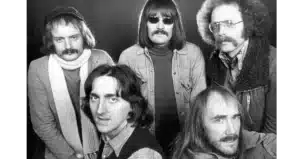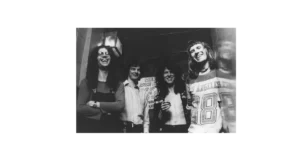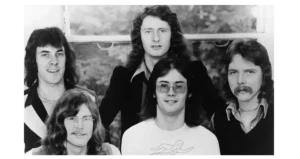Matching Mole: Robert Wyatt’s Avant-Canterbury Journey
Formation and Origins
Matching Mole was a British progressive rock band formed in 1971 by Robert Wyatt after his departure from Soft Machine, a band he co-founded in the 1960s and helped shape into one of the defining voices of the Canterbury Scene.
The name Matching Mole is a playful translation of “machine molle” — French for “Soft Machine.” This wry linguistic nod set the tone for the band’s blend of surreal humor, emotional depth, and avant-garde experimentation.
The original lineup featured:
Robert Wyatt – Drums, vocals, keyboards
Phil Miller – Guitar (later of Hatfield and the North, National Health)
Dave Sinclair – Keyboards (of Caravan)
Bill MacCormick – Bass (later in Quiet Sun and 801)
After the first album, Dave Sinclair was replaced by Dave MacRae, shifting the band’s sound into even more jazz-fusion-oriented territory.
Musical Style
Matching Mole’s music is an idiosyncratic mix of:
Canterbury-style whimsy and irony
Jazz-rock improvisation
Psychedelic and ambient textures
Fragmented yet emotional songwriting
What sets the band apart is Robert Wyatt’s voice and lyrics — deeply human, often melancholic, and delivered with a fragile sincerity. While Soft Machine was increasingly moving toward instrumental jazz-fusion, Matching Mole leaned into the emotional and personal, making their music more intimate despite its experimental nature.
Albums and Highlights
Matching Mole (1972)
Their debut album is a Canterbury classic, oscillating between lush instrumentals and lyrically raw songs like:
“O Caroline” – A heartbreakingly beautiful ballad reflecting on lost love.
“Immediate Curtain” – A 9-minute ambient epic filled with Mellotron and drones.
“Signed Curtain” – A song that satirizes pop structures by literally describing its own form (“This is the first verse…”).
The album reflects Wyatt’s emotional state post-Soft Machine, offering moments of deep beauty wrapped in experimental forms.
Little Red Record (1972)
Produced by Robert Fripp of King Crimson, this album is darker, more complex, and pushes further into avant-garde fusion. With Dave MacRae on keys and Brian Eno contributing synth textures, the music becomes denser and more improvisational.
Highlights include:
“Gloria Gloom” – A politically charged piece co-written with MacCormick.
“God Song” – Wyatt’s haunting meditation on religion and meaning.
“Marchides” – A jazz-rock instrumental tour-de-force.
Little Red Record feels more like a collective statement than a solo vehicle, and it showcases the band’s ability to balance intellect and spontaneity.
Disbandment and Legacy
Despite their artistic success, Matching Mole disbanded in 1972, when Wyatt broke up the group while planning a third album. That album was never completed — partly due to internal instability and Wyatt’s growing interest in solo work.
In 1973, Robert Wyatt suffered a tragic accident that left him paralyzed from the waist down. His solo career afterward, beginning with Rock Bottom, would retain the emotional and experimental DNA of Matching Mole, but with an even more introspective voice.
Matching Mole is now considered:
A key transitional project between early Soft Machine and Wyatt’s solo career
A band that captured the emotional core of the Canterbury Scene
One of the purest expressions of Wyatt’s artistic identity
Interesting Facts
The name Matching Mole was chosen as a joke, and the band never intended to sound like Soft Machine.
Little Red Record was released with a cover mimicking Chinese Communist propaganda, playing on the album’s political undertones and title.
Wyatt sang, drummed, and played keys live — a testament to his multi-instrumental brilliance.
After Wyatt’s accident, surviving members of Matching Mole continued in other Canterbury projects like Hatfield and the North, 801, and Quiet Sun.




